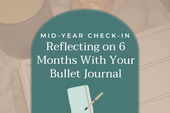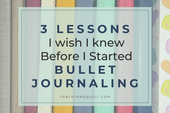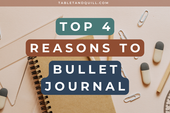Struggling to Bullet Journal? 4 Simple Ways To Get Consistent
You’ve got your bullet journal and it’s all set up and ready to use. But it’s been sitting on your shelf, lonely and unopened. If it’s been a while since you cracked open your bullet journal, I’ve been where you are!
New year plans can often slow once excitement dies down, so how do you stay consistent when that initial enthusiasm goes away? After bullet journaling for 5 years, let me share my top tips for staying consistent and making bullet journaling a habit you’ll stick with.

1. Let Go of Perfection
When I first started bullet journaling, I was amazed by the beautiful designs on Instagram. In an effort to mimic what I saw, I spent hours planning, designing, and making beautiful bullet journal spreads.
Because it took me so long to make a spread, I found myself creating spreads during the week I was supposed to be using it or sometimes even later. I ended up not wanting to use my bullet journal because it wasn't picture perfect.
But what's the point of having a tool that's too pretty to use? By letting go of wanting my journal to be Instagram ready, I was able to get myself to use my bullet journal way more.
I let go of using a pencil and ruler to plan out spreads and just went in with pens and markers. I did inevitably end up with mistakes, but those mistakes are hardly noticeable to anyone else and striving for perfection is terrible for mental health anyway.

2. Dedicate Time
It can difficult to set time aside for a new task. But if we want to really give bullet journaling a chance, it’s important to make it a priority.
There’s no reason to spend hours and hours on your bullet journal, but dedicating 10 minutes a day at the very least makes a big difference.
Are you more likely to use your journal right after waking up in the morning? Or maybe during your lunch break at work (instead of doom scrolling)? Or is the best time to use your journal right before you go to bed as a reflection tool?
Whichever time you choose, take just one week to commit to to bullet journaling for 10 minutes a day and see how it goes. Set a reminder on your phone or your calendar and pay attention to it when it goes off.

3. Remove Barriers
One of the biggest barriers for me is my own forgetfulness. I can’t count the number of times I’ve forgotten what’s in the fridge or pantry just because I didn’t see what’s inside in the last few minutes.
Journaling can be the same. Personally, I’m unlikely to use my journal if I forget it exists. So it lives on my desk so I can at least look at it every day. I also keep my dedicated pen with it so I don’t have the barrier of looking for the right tool.
In the past, I’ve also had the journal open on my desk all day that way I can scribble down a to-do quickly.
Coworking might be another solution. There are many YouTube videos you can have on as a background so it feels like coworking. You can also reach out to friends and loved ones to see if someone would be willing to cowork with you.

4. Don’t Beat Yourself Up
This is arguably the most important step in staying consistent! Sometimes we’re juggling too many balls and bullet journaling is a rubber ball that can withstand being dropped. It’s okay if consistency means taking some time off in order to come back more ready to be involved.
It’s okay if other things take priority, especially when our own energy levels are changing day-to-day.
The important thing is to not feel badly about missing some time.
If it’s a dated planner you’re using, you can go back and fill in what you remember. Or you can use the pages for art, freewriting, lettering practice, or other activities if you feel like the pages feel “wasted.” Though, I should note that the paper isn’t wasted even if you don’t do anything with them! It’s just paper and you’re more important than that!
If it’s a bullet journal you’re using, you can pick up right where you left off. No “wasted” pages to worry about.

Getting and Staying Consistent
There will always be days where it’s hard to find the time or energy to go into your bullet journal, but it’s important to remember that a bullet journal is supposed to be a tool to help get tasks done.
Unfortunately, the times we usually need a bullet journal the most are the times it gets put to the side. It’s okay if that happens! We just have to evaluate the pros and cons to spending the time or energy on bullet journaling or planning.
It’s important to make it as easy as possible for you to bullet journal by letting go of perfectionism (done is better than not done!), dedicating time, and removing barriers but it’s most important to be kind to yourself!
What are your favorite tips and tricks to get and stay consistent with either bullet journaling or a new habit? Let me know in the comments!

































